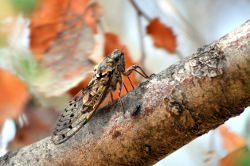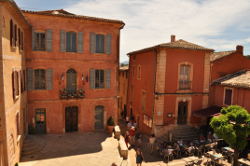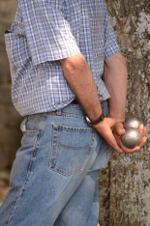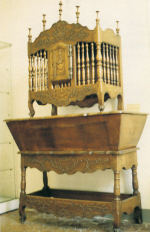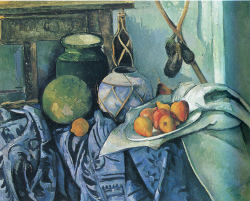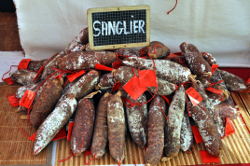|
|
|
|
Un Glossaire Glossary |
|
|
|
Chapter 1:
adieu: goodbye; literally, "to God".
taillole: a red sash worn traditionally in Provence.
cigales: cicadas that make their scratchy mating calls in hot weather by rubbing their legs together.
|
un amateur d'art: a lover of art, not a beginning artist. Amateur (one who loves) and amour (love) are related words.
Chapter 2:
La place: a square or plaza, usually opposite the Mairie or the church in villages.
|
La Mairie: the town hall where the mayor, le maire, presides.
Grâce à Dieu: Thanks to God.
rue de la Porte Heureuse: Street of the Happy Door.
boules: similar to pétanque, the traditional Provençale bowling game played on a dirt court with steel balls the size of tennis balls, by men only.
|
derrière: behind, buttocks.
quelle surprise: What a surprise!
un peu fatigué: a little tired.
fatigué: tired and weak.
bien fatigué: very tired and weak, ill.
belote: a card game.
grandpère: grandfather.
parfait: perfect.
bon Dieu: an expression of exasperation, literally, "good God".
formidable: formidable, tremendous, admirable, great; frequently used in French to express approval.
ma minette douce: my sweet kitten, used as a term of endearment.
Chapter 3:
Jardin des Plantes: Botanical garden and zoo in Paris.
fleur de lis de la mer: lily flower of the sea (not the emblem of France).
bois: woods. Bois de Boulogne: vast park on the west side of Paris.
la reine de ma coeur: queen of my heart.
Pont Neuf: the oldest bridge across the Seine, translated literally as "new bridge," a name preserved from the time it actually was new.
l'église: church.
confiserie: candy shop.
pâtisserie: pastry shop.
café: In French cafés, a small cup of strong black coffee is called un (petit) café, un express, or un petit noir. An express with a tiny amount of milk added is called une noisette. A large cup of black coffee is un grand café, un double express, or un grand noir. Coffee with frothy, steam-heated milk is called un grand/petit crème. The term café au lait is almost never used in cafés.
palmier: a flat, flaky leaf- or heart- or elephant ear-shaped pastry drizzled with caramel. My favorite!
canotier: a straw boating hat with flat top. Canotier is also a rower. Canotage is boating. These words are all used in my novel. Luncheon of the Boating Party, Le Déjeuner des canotiers.
boutique d'herboriste: shop of a herbalist.
Chapter 4:
boulangerie: bakery.
boulanger: male baker.
boulangère: female baker.
baguette: long narrow loaf.
salle: the main room of a private home. In villages, it served as livingroom, dining area, and kitchen.
panetière: large, wall-hung cabinet for bread allowing air passage between spindles and in delicate openwork. These are particularly traditional in Provençal homes.
|
poésie bien provençale: term of admiration in Provence.
pétrin: table with storage beneath for bread to rise and for storage of flour.
bien sûr: certainly, of course.
haut bourgeois: upper middle class.
Chapter 7:
mes chers amis: my dear friends.
profonde: deep.
merveilleux, merveilleuse: marvelous.
quel trône: what a throne!
terres vernissées: glazed (varnished) terra cotta pottery.
|
bieng: phonetic spelling of bien, "well," in the accent of Provence.
Chapter 8:
toupin: traditional Provençal olive jar the neck and shoulder of which is usually glazed green.
pigeonnier: dovecoat for pigeons to roost.
salmis: sausage of pigeon.
la réalisation: the execution or carrying out or fulfillment or achievement of something.
daube: a ragout of beef, tomato, orange peel, carrots, onions, and red wine. See "Cuisine" page.
Chapter 9:
Boeuf Arlésien: beef stew prepared as in Arles. See "Cuisine" page.
sanglier: wild boar.
|
garde champêtre: constable; warden of the rural area surrounding a village or town.
commune: a rural district. The term is not used to mean goods or land held in common, nor is it to be associated with communism.
minette: term of endearment, pussycat.
Chapter 10:
joli / jolie: pretty, lovely, attractive.
Chapter 11:
école élémentaire: elementary school.
mon petit trésor: term of endearment, my treasure, darling.
Quelle catastrophe: What a catastrophe!
J'attendrai: I will wait. A popular wartime love song.
Rena Ketty singing "J'attendrai" with photos of French soldiers
Jean Sablon singing "J'attendrai"
J'attendrai lyrics, French and English
Chapter 14:
une veillée: an evening gathering of friends after dinner.
Allons enfants de la patrie, le jour de gloire est arrivé: Words from the Marseillaise: Let's go, children of the fatherland. The day of glory has arrived.
Chapter 15:
miam, miam: yum, yum.
Chapter 16:
centime: cent.
bucherie: butcher's shop.
Chapter 20:
maquis: wild scrub land. Le Maquis: French Résistance, named for the terrain of their camps.
Maquisard: a member of the Résistance, with the connotation of lawlessness.
Chapter 23:
mas: a Provençal farmouse.
vendange: the picking of grapes in the fall.
Chapter 25:
Mon Dieu!: My God!
Chapter 26:
cafétier: owner of a café.
Le Sentier des Ocres: the Path of Ochres (in the French, there is no "h" in ocre).
épicerie: small grocery store.
Chapter 29:
chanteurs: singers. "Il est né, le divin enfant." He is born, the divine infant.
"S'il vous plaît, madame, je voudrais une pomme:" If you please, madam, I would like an apple.
santon: a crêche figurine made of clay or carved wood used in small nativity scenes.
"Les Anges dans nos campagnes." The angels in our countrysides, a Christmas carol.
Chapter 30:
chant de Noël: Christmas carol.
canaille songs: songs of the street with sexual innuendos.
la Revue nègre: Negro variety show. Josephine Baker, a black American singer and dancer, was wildly popular between the wars. She is well known for her song, "J'ai deux amours," which she identifies as "my country and Paris."
Josephine Baker singing "J'ai Deux Amours"
J'ai deux amours lyrics, French and English
Chapter 33:
Bien sûr. Sans doute: Surely, certainly. Without doubt.
encore et toujours: again and always.
Chapter 34:
flâneur: a keen social observer (a man) who walks the streets, goes to cafés and cabarets, watches people, and writes of their propensities. Flâneuse is the female counterpart.
Chapter 38:
soirée: festive event in the evening.
Chapter 40:
pension: boardinghouse.
Il y a longtemps que je t'aime: I have loved you for a long time. A traditional, childlike song with the title "A la claire fontaine." " I have loved you for a long time. Never will I forget you."
A la claire fontaine
|
|
|
|
